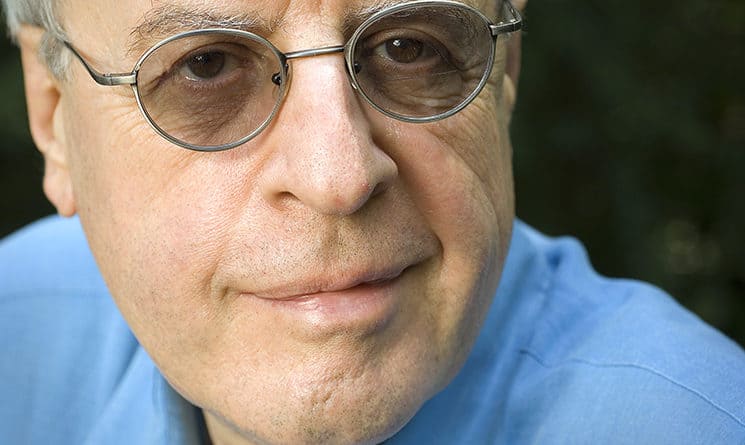and the difference between writing prose and poetry
Alternately surreal, metaphysical, grimly realistic and sharply clear, Charles Simic’s writing reflects a life spent surrounded by conflict. The former United States Poet Laureate was born in Belgrade, Serbia in 1938 and left war-torn Europe for America in 1954. Since the 1970s, Simic’s poetry has been praised for its honesty, dark humor, and insights that cut nerves previously left unexposed. He received a Pulitzer Prize in 1990, and his poetry and prose have appeared in The New Yorker, “The Best American Poetry,” and dozens of other publications and anthologies.
His two latest books, “The Lunatics,” a collection of poems, and “The Life of Images,” a prose collection, are perfect examples of Simic’s range, with poems about mortality and personal essays on literary criticism and his own childhood. Simic is also a local — he lives in Strafford County and is a professor at the University of New Hampshire, where he’s taught poetry since 1972. He’ll celebrate the books with readings at RiverRun Bookstore in Portsmouth and Water Street Bookstore in Exeter this month. The Sound recently caught up with Simic and asked him about the difference between writing poetry and prose, the power of public readings, and how his new books came together. (Full disclosure: Simic was my teacher and thesis advisor at UNH.)
Can you explain what it is about readings that engages or interests you? What would you like for audiences at your readings to come away with?
Nowhere are the weaknesses and strengths of a poem revealed as much as in a public reading, so I’m eager to find that out about my poems. In addition, as a poet, I want not just to move my readers, but to entertain them, too, so this an opportunity.
I’ve always felt that entertaining and engagement go hand in hand, especially in performances, but also in the classroom. Could you talk about what teaching is like for you, given how long and successfully you’ve been at it? Does teaching contain these components for you?
I’ve taught literature courses and poetry workshops and I love teaching them both. In the first case, my task is to convey a great amount of information about various poets and writers and make it interesting and exciting and, in a workshop, to give the students practical advice about their own writing and show them how to turn their rough drafts into poems. I’m a kind of poet who endlessly tinkers with his poems, so I take great pleasure in doing that with other people’s poems, too.
What inspired your two new books? Why did you write them?
That’s not how it works with me. I don’t write books. I write poems all the time and, after a few years, check if some of them could make a book. It’s the same with prose. I’ve published hundreds of pieces over the last 35 years and “The Life of Images” is the selection of some of the better ones.
How do you decide when a group of poems can make a book? Is it a certain number, or are you looking for cohesion or a narrative or a theme?
It differs from poet to poet, but in my case it comes down to having enough poems that I really like and then figuring out how they work together as a book. That can take weeks or many months, but I don’t mind waiting.
How different is the process for you when writing prose and writing poetry? A lot of writers struggle making a transition between the two.
Prose requires that I keep regular hours and work five to six hours per day writing carefully constructed sentences and paragraphs, while poetry is more like doodling, a form of writing done now and then with no advanced planning. It’s like being a dog one day and a cat another day.
In an interview with The Cortland Review, you said, “Being one of the millions of displaced persons (from Europe) made an impression on me. In addition to my own little story of bad luck, I heard plenty of others. I’m still amazed by all the vileness and stupidity I witnessed in my life.” In your writing, are you are able to give a voice to some of those “others,” and if so, do you feel that clarity and accuracy of that voice is important?
I hope I do, but it’s not something I intentionally strive for. In other words, I don’t start a poem thinking, “Give a voice to XYZ.” I write about what pops into my head as I take a pencil and paper. As for clarity, yes, I’m all for it. Accuracy is the concern of historians; we poets makes things up as we go and try to tell the truth about the world that way.
How much of your writing comes from a place maybe beneath a conscious level, and how much of it is an effort to construct something with particular craft or a destination
in mind?
Most poetic imagery comes from the unconscious, or the imagination, if one prefers that word. One cannot consciously construct a good simile or a metaphor; they are involuntary eruptions of language and if they are really memorable, they astonish their author as much as they do the reader. Everyone has that capacity to see previously unperceived resemblances in seemingly dissimilar things at times, but poets thrive on it.
Charles Simic will be at RiverRun Bookstore, 142 Fleet St., Portsmouth, on Thursday, April 2 at 6:30 p.m. He’ll also be reading at Water Street Bookstore, 125 Water St., Exeter, on Thursday, April 23 at 7 p.m.

